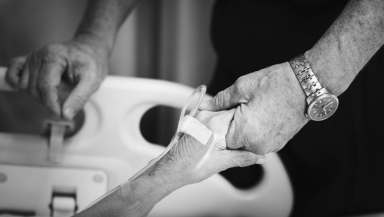
Baroness Meacher's Assisted Dying Bill will not go before MPs because she did not push for a vote at its Second Reading in the House of Lords, anti-euthanasia group Right to Life has said.
Following the debate in the Lords on Friday, the group said Baroness Meacher's decision not to take her proposal to a vote was because of "mass opposition from Peers", with over 60 of them speaking against it.
"The assisted suicide lobby would likely have pushed for a vote at Second Reading if they felt they had the numbers to win a division," the group said.
In the House of Lords, a Bill does not need to win a vote to progress to the next stage, but "Baroness Meacher could have divided the House in the hope of winning the vote to demonstrate support for introducing assisted suicide from the House of Lords", it explained.
"If she had won this division, it would have helped give additional momentum to the assisted suicide lobby's campaign.
"The Bill will now to proceed to Committee Stage, but is unlikely to be given time in Parliament to be debated in the House of Commons and become law, given that it is not supported by the Government," Right to Life said.
Responding to the debate, Justice Minister Lord Wolfson of Tredegar said the Government's position on the Bill was "neutral".
Right to Life highlighted the "scathing criticism" from leading lawyer Lord Carlile of Berriew QC of the Bill's legal demands on the High Court's Family Division to approve requests for assisted suicide.
"The Bill therefore asks a Family Division judge to approve something no judge has ever been asked to do since the abolition of the death penalty," Lord Carlile said in the debate.
The debate also heard from the Archbishop of Canterbury, who called the proposals"unsafe", while the Bishop of Carlisle, James Newcombe, the Church of England's lead bishop on medical ethics, spoke of "the need to put our time, effort, and resources into improving palliative care, rather than promoting suicide for those who are terminally ill".
"The doctor-patient relationship [...] would be affected so substantially by any change to the present law," he added.
Catherine Robinson, Right to Life spokesperson, said it was "a great outcome" that the Bill was not taken to a vote.
"We have increasing evidence that people's wishes to die are transient. The Irish Longitudinal Study on Ageing, for example, surveyed 8,174 people over the age of 50 and found that 3.5% expressed a wish to die at Wave 1 of the study.
"However, 72% of these participants no longer reported a wish to die when reassessed two years later.
"It is no coincidence that many prominent people with disabilities, plenty of disability rights groups, and many respected healthcare professionals continue to rally against introducing assisted suicide, for it strikes against the very heart of the dignity and care we ought to afford to each human being," she said.













